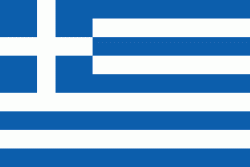Trikala
Trikala is a lively Greek city with picturesque monuments and old neighborhoods with traditional architecture. The city is near Meteora and also near the mountain range of south Pindus, where there are many destinations (i.e. Pyli's stone bridge, Elati, Pertouli, Palaiokarya's stone bridge and waterfall, Pertouli Ski Center etc.).
The city's name derives from the ancient Trikka or Trikke (Τρίκκα or Τρίκκη, which was itslef named after a nymph that was a daughter of Peneus or Asopos. The name Trikala appears in the Byzantine period. In Ottoman Turkish it was known as Tirhala. In Aromanian it is known as Trikolj.
Map - Trikala
Map
Country - Greece
 |
 |
| Flag of Greece | |
Greece is considered the cradle of Western civilization, being the birthplace of democracy, Western philosophy, Western literature, historiography, political science, major scientific and mathematical principles, theatre and the Olympic Games. From the eighth century BC, the Greeks were organised into various independent city-states, known as poleis (singular polis), which spanned the Mediterranean and the Black Sea. Philip II of Macedon united most of present-day Greece in the fourth century BC, with his son Alexander the Great rapidly conquering much of the ancient world, from the eastern Mediterranean to the North Western parts of India. The subsequent Hellenistic period saw the height of Greek culture and influence in antiquity. Greece was annexed by Rome in the second century BC, becoming an integral part of the Roman Empire and its continuation, the Byzantine Empire, which was culturally and linguistically predominantly Greek.
Currency / Language
| ISO | Currency | Symbol | Significant figures |
|---|---|---|---|
| EUR | Euro | € | 2 |
| ISO | Language |
|---|---|
| EN | English language |
| FR | French language |
| EL | Greek language |















